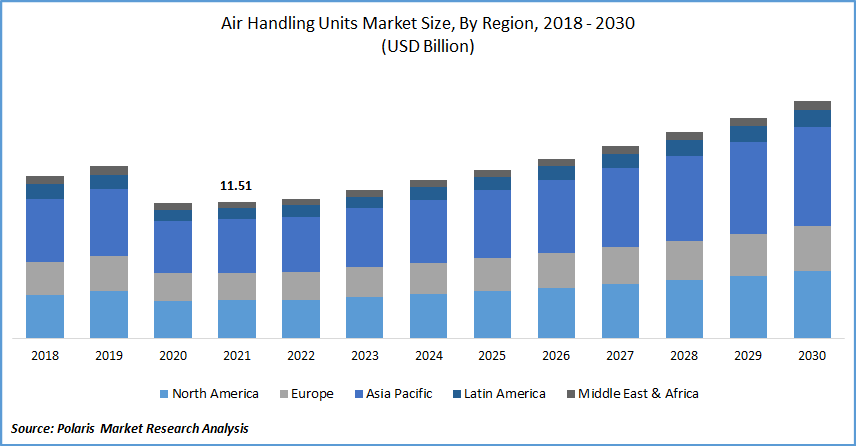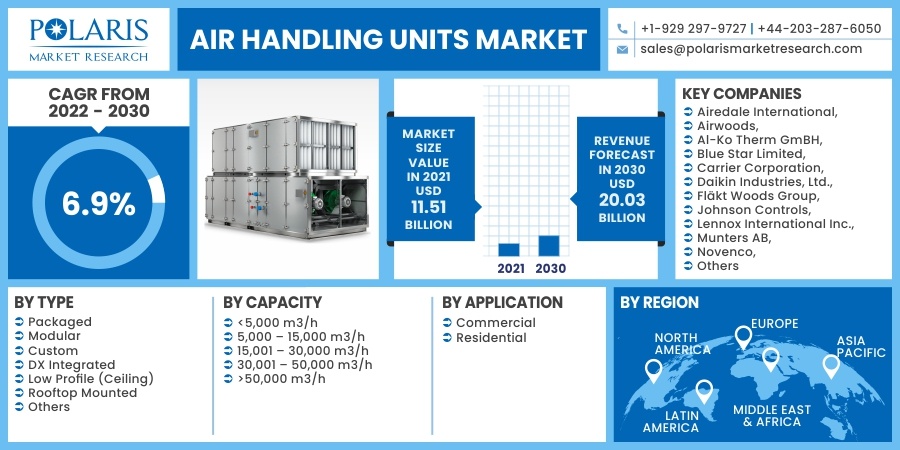
Air Handling Units Market Share, Size, Trends, Industry Analysis Report, By Type (Packaged, Modular, Custom, DX Integrated, Low Profile, Rooftop Mounted, Others); By Application (Commercial, Residential); By Capacity; By Region; Segment Forecast, 2022 - 2030
- Published Date:Jan-2022
- Pages: 114
- Format: PDF
- Report ID: PM2166
- Base Year: 2021
- Historical Data: 2018 - 2020
Report Outlook
The global air handling units market was valued at USD 11.51 billion in 2021 and is expected to grow at a CAGR of 6.9% during the forecast period. The AHU (Air Handling Units) is a central air filtration system that filters the air in order to maintain indoor air quality and temperature. It primarily consists of ventilators, heating & cooling coils, sound attenuators & dampers, and filter chambers.
 Know more about this report: request for sample pages
Know more about this report: request for sample pages
The global industry of air handling units is mainly driven by the rising demand for energy-efficient HVAC systems from both the commercial and residential sectors. The rising adoption of central heating & cooling systems on account of rapid industrialization globally is anticipated to drive the industry growth.
Furthermore, the growth in urbanization across developing nations such as India, Japan, and China, among others, is anticipated to offer huge growth opportunities. The benefits offered by air handling units are projected to boost industry growth as this system can filter out the toxic pollutants that can cause various respiratory disorders including asthma, lung cancer, and COPD (chronic obstructive pulmonary disease), among others. Additionally, the integration of innovative technologies such as IoT (Internet of Things) and sensors is projected to offer lucrative growth prospects.
The onset of the COVID-19 reflects the downfall of the air handling units market growth owing to the unprecedented restrictions on movement along with the disruptions in personal and business activities. Due to pandemic spread, air handling unit manufacturers closely monitor their expenditure, wholesalers reduce their inventories, and supply chains suffer interruptions. The disruption in the supply chain, lockdown measures, and limited consumer and corporate spending is anticipated to hamper the industry growth.
Further, the production of various companies is hampered due to the virus spread. For instance, in March 2020, Carrier Corp. temporarily closed its production at manufacturing facilities across Asia, Europe, and North America due to safety reasons along with the reduced demand for their products. The pandemic spread had a negative impact on the end-user of the industry, thus affecting the growth of the air handling units market directly. However, the demand for air handling units is projected to bounce back in the approaching years as the governments across nations are uplifting lockdown restrictions, and the economy is booming up again.

Know more about this report: request for sample pages
Industry Dynamics
Growth Drivers
The primary factor driving the growth of the market can be attributed to the rising demand from various application sectors such as residential and commercial buildings. Moreover, the growth in urbanization and population globally is anticipated to drive the demand for ACs, driving the industry growth. According to World Bank, over 55% of the global population resides in urban areas. Further, this trend is projected to continue over the coming years. This growth in the urban population is contributing to the growing demand for residential, commercial, and retail buildings. The growth in the construction of these buildings is anticipated to drive the demand for efficient HVAC systems, which include air handling units.
Additionally, the rapid adoption of IoT (Internet of Things) within AHUs/HVAC systems is expected to present lucrative growth opportunities to the global market. The use of IoT helps collect data and stores it on the cloud to improve the efficiency and operations of the system. The implementation of IoT in AHU/HVAC systems will allow access to real-time performance data of the system, enabling remote diagnosis and minimizing system failures.
Report Segmentation
The market is primarily segmented on the basis of type, capacity, application, and region.
|
By Type |
By Capacity |
By Application |
By Region |
|
|
|
|
Know more about this report: request for sample pages
Insight by Capacity
The <5,000 m3/h capacity segment is recorded to hold the larger shares in 2021 and is likely to lead the industry in the forecasting years. These air handling units are small and primarily used across small premises. Thus, they are quite dominant in single-family homes across the residential sector. The rise in the number of single-family homes across nations such as the US and Canada, among others, is anticipated to boost the demand for these air handling units. Further, the increasing demand for this small capacity AHU from small-scale retail stores is anticipated to drive the growth of the segment.
The 15,001-30,000 m3/h capacity segment is projected to show the fastest growth rate in the forecasting years. The fast growth of the segment can be attributed to the rising demand from commercial buildings including hospitals, shopping malls, data centers, and laboratories, among others. These are medium-capacity air handling units and have a wide range of commercial applications. Further, the rising awareness regarding the use of AHU’s is anticipated to drive the growth of the segment.
Geographic Overview
Geographically, Asia Pacific is projected to dominate the air handling units market in 2021. Rising demand for air handling units from the fast-growing industrial areas in the region is one of the primary factors accountable for this high market share of the region. Moreover, the rising commercialization and the increasing urbanization in the Asia Pacific are anticipated to contribute to the rising demand for AHU’s.
Developing nations such as China, India, and Japan are offering huge growth opportunities for the players operating in the market. Further, the presence of a large customer base across the region is anticipated to drive market growth. The changing living standards coupled with the increasing per capita income of the population in the developing nations is projected to present huge market growth opportunities.
Moreover, the North American air handling units market is anticipated to exhibit a progressive CAGR over the forecasting years. The rising number of initiatives by government authorities for the use of energy-efficient systems by offering tax benefits and subsidies is expected to drive the growth of the market in the region. Further, the growing focus on the development of innovative air handling units is anticipated to boost the market growth. This development of new innovative energy-efficient air handling units is enabling consumers to upgrade their old systems. Additionally, the rising number of infrastructure projects and the rising concern for air quality is anticipated to drive the market's growth.
Competitive Insight
Some of the major players operating in the global market include Airedale International, Airwoods, Al-Ko Therm GmBH, Blue Star Limited, Carrier Corporation, Daikin Industries, Ltd., Fläkt Woods Group, Johnson Controls, Lennox International Inc., Munters AB, Novenco, Swegon, Trane Technologies Plc, Trox GmBH, and VTS Group.
Air Handling Units Market Report Scope
|
Report Attributes |
Details |
|
Market size value in 2021 |
USD 11.51 billion |
|
Revenue forecast in 2030 |
USD 20.03 billion |
|
CAGR |
6.9% from 2022 - 2030 |
|
Base year |
2021 |
|
Historical data |
2018 - 2020 |
|
Forecast period |
2022 - 2030 |
|
Quantitative units |
Revenue in USD million/billion and CAGR from 2022 to 2030 |
|
Segments covered |
By Type, By Capacity, By Application, By Region |
|
Regional scope |
North America, Europe, Asia Pacific, Latin America, Middle East & Africa |
|
Key companies |
Airedale International, Airwoods, Al-Ko Therm GmBH, Blue Star Limited, Carrier Corporation, Daikin Industries, Ltd., Fläkt Woods Group, Johnson Controls, Lennox International Inc., Munters AB, Novenco, Swegon, Trane Technologies Plc, Trox GmBH, and VTS Group. |
